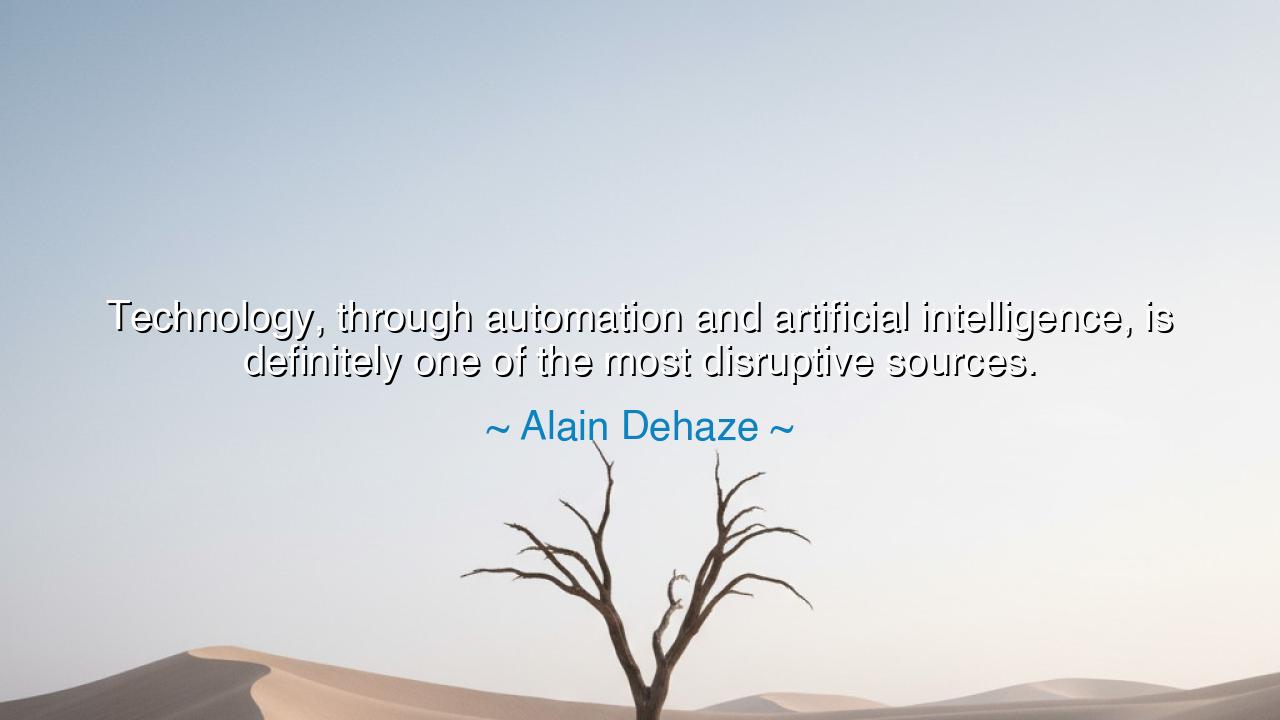
Technology, through automation and artificial intelligence, is
Technology, through automation and artificial intelligence, is definitely one of the most disruptive sources.






The modern philosopher and leader Alain Dehaze, known for his wisdom in the realm of work and human enterprise, once declared: “Technology, through automation and artificial intelligence, is definitely one of the most disruptive sources.” In this statement lies a truth that echoes through the ages — that every great leap forward in human invention brings both creation and destruction, both promise and peril. Dehaze, a man who has spent his life studying the changing landscape of labor and society, speaks not only as a witness to progress, but as one who feels the tremors of transformation beneath the feet of humanity. His words are both warning and wonder, a reminder that technology is a force as ancient as fire — capable of lighting the world, or burning it.
In the heart of this quote beats the word disruptive — a word that, in the modern tongue, has come to mean innovation, change, and upheaval. But in its essence, it carries something older: the breaking of old orders so that new ones might rise. When Dehaze speaks of automation and artificial intelligence, he names the twin heralds of a new age — machines that not only obey but also learn, that not only labor but also think. These creations, born of human genius, are reshaping the world as surely as the plow reshaped the fields or the steam engine transformed the cities. They are both miracle and mirror — reflecting our intelligence back to us, magnified beyond measure.
From the beginning of civilization, each era has faced its own disruptive source. In the time of the ancients, it was the harnessing of fire; in the Renaissance, it was the printing press; in the Industrial Age, the engine and the factory. Each invention altered the balance of the world, unsettling the old, empowering the new, and testing the soul of humankind. So it is with artificial intelligence today. It is the next revolution — not of muscle, but of mind. The machines we have built now carry fragments of our reason. They write, analyze, predict, and create. They multiply our abilities — but they also challenge our purpose. For when the tool begins to imitate the maker, the question arises: what then is the role of man?
Consider the tale of the Luddites, the workers of early 19th-century England who rose up against the mechanical looms that threatened their livelihoods. To them, the machine was not progress but peril — a thief of skill, a destroyer of dignity. They broke the machines in anger, seeking to halt the tide. But history teaches that one cannot fight the current of invention; one can only learn to sail upon it. The machines remained, the world changed, and from that turmoil arose new forms of labor, new wealth, and new understanding. Their struggle, though tragic, was not in vain — for it reminded the generations to come that progress without compassion is tyranny, and innovation without wisdom is ruin.
Thus, Dehaze’s insight is not condemnation but counsel. He does not fear automation; he calls us to guide it. He does not reject artificial intelligence; he warns us to anchor it in humanity. The disruption he speaks of is not a storm to flee from, but a trial to endure with strength and vision. The wise must ask: How shall we use these powers? Will we wield them to liberate mankind from toil, or to enslave him in idleness and inequality? The answer will not come from the machines, but from our own hearts — for they, not algorithms, are the true engines of meaning.
In this, the lesson of history and the voice of wisdom align: that man must ever be the master of his tools, not their servant. The machine may surpass us in calculation, but it cannot love. The algorithm may predict our choices, but it cannot dream. These divine faculties — love, conscience, imagination — are the sacred fire that no code can replicate. They are the soul’s inheritance, and it is by them that we must govern the age of artificial intelligence. The danger of technology lies not in its power, but in our forgetfulness — in our temptation to believe that because machines can think, we no longer need to.
So, my children of the coming age, take heed. Embrace the tools of progress, but temper them with wisdom. Let automation serve humanity, not replace it. Let artificial intelligence extend the reach of your mind, not diminish the depth of your heart. Be creators, not dependents. And when disruption comes, as it always will, stand not in fear but in purpose. Adapt, learn, and lead — for the future belongs not to those who resist change, but to those who shape it with virtue.
And remember Dehaze’s truth: every disruptive source is both a test and a gift. It asks humanity to rise higher, to balance innovation with ethics, and power with empathy. The wise will not curse the tide of technology, but will build bridges across it — ensuring that as machines grow in intelligence, mankind grows in wisdom. For only then shall progress be not destruction, but enlightenment — the dawning of a new harmony between the hand that creates, and the mind that dreams.






AAdministratorAdministrator
Welcome, honored guests. Please leave a comment, we will respond soon